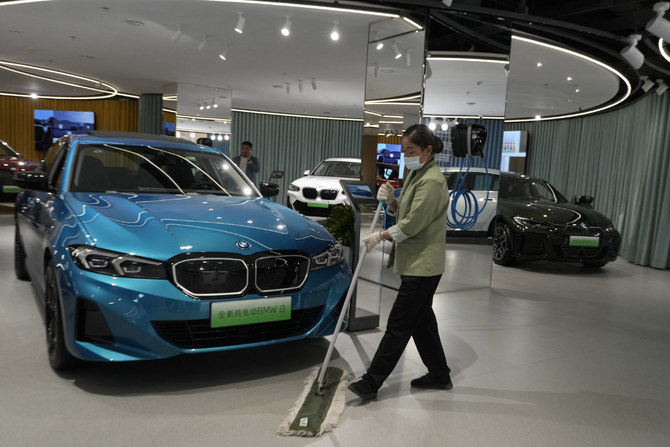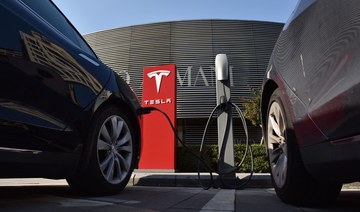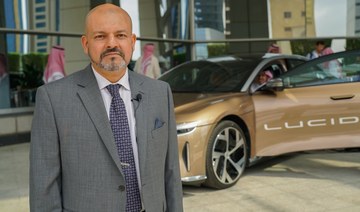SHANGHAI: Global and Chinese automakers plan to unveil more than a dozen new electric SUVs, sedans and muscle cars this week at the Shanghai auto show, their first full-scale sales event in four years in a market that has become a workshop for developing electrics, self-driving cars and other technology.
Automakers are competing to roll out faster, more luxurious, more feature-drenched electric vehicles in the technology’s biggest, most crowded market. The ruling Communist Party has invested billions of dollars in subsidies to buy an early lead in an emerging industry. Established global brands face intense competition from Chinese rivals.
For the first time since 2019, executives are flying in from the United States, Europe and Japan for the world’s biggest auto show after anti-virus curbs that blocked most travel into China were lifted in December. Auto shows in the industry’s biggest market went ahead during the pandemic, but on a smaller scale. Global brands were represented by employees of their China operations.
Drivers in the world’s biggest auto market bought 5.4 million pure-electric vehicles last year, or about two-thirds of the global total of 8 million, plus 1.5 million gasoline-electric hybrids. That was more than one-quarter of total auto sales of 23.6 million. This year’s EV sales are forecast to rise another 30 percent.
“Consumers lost interest in gasoline cars. That is the biggest challenge for foreign brands to compete in China,” said industry analyst John Zeng of LMC Automotive. “They are going to have to show their best EV products.”
Beijing is winding down government support and shifting the burden to automakers by requiring them to earn credits for EV sales. Manufacturers are pouring billions of dollars into developing models that can compete on price and features without subsidies. Many are forming partnerships to share soaring costs.
Auto Shanghai 2023 fills the cavernous Shanghai exhibition center, a 1.5 million-square-meter (16 million-square-foot) subcontinent of a building that is among the world’s biggest.
Volkswagen AG, the country’s top-selling brand, says it plans to display 28 models, half of them electrified. VW says it will debut its ID.7 limousine, which promises a 700-kilometer (435-mile) range on one charge.
China’s BYD Auto, which competes with Tesla Inc. for the title of world’s biggest-selling electric automaker, says it will display for the first time its U9 supercar from its luxury Yangwang brand. The automaker says the U9, with a 1 million yuan ($145,000) sticker price, can accelerate from zero to 100 kph (60 mph) in two neck-straining seconds.
China’s auto sales peaked in 2017 at 24.7 million but collapsed in 2020 to 20.2 million after dealerships closed as part of efforts to contain COVID-19. They are recovering but are yet to return to the pre-pandemic level.
The ruling party’s support for EV development is part of plans to gain wealth and global influence by transforming China into a creator of profitable technologies.
That campaign has strained relations with Washington and other trading partners, which are cutting off access to advanced processor chips used by makers of smartphones, electric cars and other high-tech products. China’s own foundries can supply low-end chips used in many cars but not processors for artificial intelligence and other advanced functions.
Sales of gasoline-electric hybrids and pure-electric vehicles rose 26.2 percent over a year ago in the first three months of 2023 to 1.6 million, according to the China Association of Auto Manufacturers. Sales of pure electrics rose 14.4 percent to 1.2 million while hybrids increased 75.1 percent to 433,000.
Tesla and some other brands cut prices by 5 percent to 15 percent starting in January after sales growth slowed, though to still-robust levels compared with the slack US and European markets. That prompted warnings the squeeze on an industry with dozens of fledgling brands might force smaller automakers into mergers or out of business.
China also is, along with the United States, a leader in development of self-driving taxis and trucks.
Baidu Inc., best known as a search engine operator, is the most prominent among developers that also include Pony.ai. Geely Group, owner of Volvo Cars, Lotus and Polestar, has announced plans for satellite-linked autonomous vehicles. Network equipment maker Huawei Technologies Ltd. is working on self-driving mining and industrial vehicles.
Baidu and Pony.ai received China’s first licenses to offer autonomous ride-hailing services in Beijing with a safety driver aboard to take over in the event of an emergency in 2022. That came 18 months after Alphabet Inc.’s Waymo started driverless ride-hailing service in Phoenix, Arizona.
“We see very strong support from the government,” said Jason Low of Canalys.
At the auto show, Chinese brand Aito plans to display its new M5 SUV with autonomous technology developed in an alliance with Huawei Technologies Ltd. The telecom equipment maker is expanding into the auto and other industries after US sanctions imposed in a feud with Beijing over technology crushed Huawei’s smartphone business.
China’s market is so huge that even brands whose strongest selling point is roaring, gasoline-powered engines are embracing electrics.
BMW AG says its whole vehicle lineup at Auto Shanghai will be electrified. The German sport luxury brand says it will unveil two new models, the i7 M70L and XM Red Label, and show its M760Le in China for the first time.
Italy’s Maserati, a Stellantis unit known for using high-performance Ferrari engines, plans to unveil its first electric SUV and says its electric sports car will get an Asia premiere.
Chinese luxury EV brand NIO Inc., which competes with Tesla at the premium end of the market, plans to display its latest SUV, the ES6. It promises a 610-kilometer (380-mile) range on one charge.
Mercedes Benz plans to unveil an electric SUV under its luxury Maybach brand and two SUVs. The company also has EV joint ventures with BYD Auto and Geely Group.
Toyota says it plans to unveil two new models in its bZ line of zero-emissions vehicles. Nissan plans to display its Max-Out electric convertible concept car. Honda is debuting a new prototype for its China-focused e:N electric brand.
Despite such investments, Western and Japanese brands need to be more aggressive about EV development to keep up with China’s rapid evolution, said LMC’s Zeng. He said many take too long to create models abroad without Chinese input.
“The model they bring to China lags behind Chinese models by three or four years in driving range and equipment,” Zeng said. “They have to learn to design and test cars in China for China.”

























